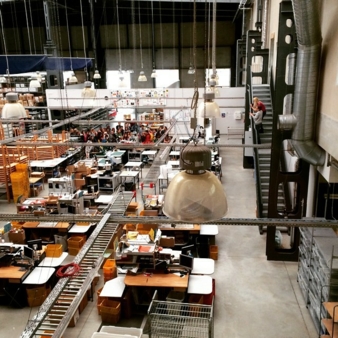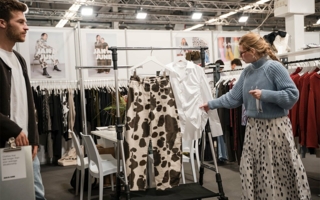09/11/2015 – E-Commerce — auf Deutsch lesen
Spreadshirt: “The cranks”
In 2002, Lukasz Gadowski, then a student at the Leipzig Graduate School of Management, founded the Spreadshirt online T-shirt platform together with Matthias Spieß. Their vision: to make it as easy as possible for website operators around the world to integrate their own online shops.
“A man with a new idea is a crank until the idea succeeds” – numerous start-up success stories have begun with these words from Mark Twain, including that of Lukasz Gadowski and his company, which also told of initial difficulties and setbacks. The renowned, Cologne-based NUK Business Plan Competition described Spreadshirt as an “unrealistic business model”, and their search for external funding remained fruitless for a long time.
Today, 13 years later, the e-commerce company ranks among the leading platforms worldwide for on-demand clothing and accessories printing, with a turnover of 72m Euro. Spreadshirt operates in 19 markets in 12 languages and dispatches around 3.3 million products to over 150 countries each year. This equates to up to 19,000 orders on their busiest days. Alongside T-shirts, the product range also encompasses 150 further products, including a variety of accessories such as kitchen aprons, fabric tote bags and mobile phone covers.
How has Spreadshirt managed to become so successful in such a short period of time? We have identified seven ingredients that contribute to this online companys recipe for success.
Individuality and creativity are at the heart of their business model and therefore constitute a vital, core ingredient for the companys success. Spreadshirt provides private individuals, companies and organisations with a platform to design and market their ideas.
True to their motto of „buy, sell, create“, Spreadshirt customers are able to browse through the large image gallery on the Spreadshirt marketplace for designs from around 70,000 active sellers, or are able to become sellers themselves. For these purposes, Spreadshirt provides a variety of distribution channels at no additional cost, such as White Label Shops as well as Spreadshirt-specific and external marketplaces. Additionally, individual fulfilment solutions via API and plug-ins are offered. Those who would rather get to work creatively can create their own T-shirts using the interactive T-Shirt Designer.
T-shirts are a means of expressing opinions. Spreadshirt provides people with a platform to express their own ideas, statements or feelings. For the company, however, this also means taking on a special responsibility. Spreadshirt will not and cannot print every image and every statement. As well as upholding its legal obligations regarding copyright law and prohibited materials such pornography, violence and discrimination, the company also carefully reviews the content of every design.
This identifies images which could offend other people through contempt or hatred, and which clash with the platforms ethical principles. Quality and responsibility can also be seen in Spreadshirts product range. In this regard, there are not only certificates and seals for the organically-produced textiles and products on offer, but there is also the companys own product line. With its own collection, Spreadshirt has a direct influence on sustainable, fair, and high-quality textiles production.
The online company obtains 80 percent of its sales from outside Germany. Internationalisation is an important ingredient in Spreadshirts recipe for success. The e-commerce company delivers to over 150 countries on six continents, allowing its customers to buy and sell products around the globe. The takeover of Brazilian e-commerce provider Vitrinepix represents a milestone in the companys international expansion. Through this acquisition in Brazil, Spreadshirt has gained direct access to one of the most rapidly growing online markets in the world. In addition to the companys headquarters in Leipzig, Spreadshirt has seven further locations.
Production is carried out in four different countries, including two production facilities in the United States. Alongside global orientation, appropriate local adaptation is equally important for long-term success. Spreadshirt operates with a dedicated web presence in 19 markets. With a selection of 12 languages and 11 currencies, the platform also offers its customers additional, country-specific products.
If you want to be successful in this industry, then you have to cater to the customers needs. In this context, as an online platform, Spreadshirt is in a position to quickly accommodate customers wishes and to experiment with new ideas. Its product range is continually expanding to include new colours, fashions and product categories. For example, mobile phone covers were incorporated into the product range during the smartphone boom, just as travel coffee mugs appeared with the rise of the “to-go” culture.
The needs of the customers not only determine current fashion trends. The number of mobile visitors on smartphones or tablets is rising constantly. Spreadshirt is addressing these changing user habits with a touchscreen-optimised version of its T-Shirt Designer, as well as further improvements to mobile searches for inspiration and products, and an intuitive payment and checkout process via consumer mobile devices. With the current relaunch of the shop system, all services and sales channels are now optimised for mobile users. The further technical development of the platform is constantly shaped by early involvement of the users, for example through beta testing.
In order to continue offering their growing customer base demographic-specific deals, Spreadshirt has its own sub-brands. Its subsidiary company Yink specialises in large-scale customers in the textiles and promotional materials printing sector. Teamshirts focuses on specialised services and functions for the growing number of group orders, such as sports teams, stag parties, or company events. The range and breadth of the Spreadshirt family is a central driver of growth and is therefore a vital ingredient in the companys success.
Within a very short period of time, Spreadshirt has developed from a Leipzig-based start-up into an international company with 550 employees in six countries. Spreadshirt has been successful in preserving the atmosphere of a young, dynamic company. Flat hierarchies, opportunities for individual growth and influence, and room for creativity define the working environment at Spreadshirt. In general, familiar and friendly cooperation reigns supreme in the company. Their Feel Good Manager Stefanie in particular takes care of the employees well-being and ensures that fun is never in short supply at work.
The success story of Leipzig-based Spreadshirt will continue to be written in the coming years with one or another extra ingredient surely being added into the mix. One thing is certain: the idea behind the e-commerce platform can no longer be dismissed as the work of “cranks”. For Mark Twain, that is proof enough of success.





